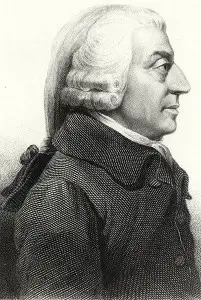
Adam Smith is a popular economist, philosopher and thinker from 18th century Scotland. He is best known as the author of the famous ‘An Inquiry into the Nature and Causes of the Wealth of Nations’ and the ‘Theory of Moral Sentiment’. He is known to be a strong proponent of classical economics which argues for free markets and free economies for economic progress”he is famously associated with the ‘Invisible Hand Theory’. Smith was also a friend of the famous Philosopher David Hume with whom he has several correspondences. His work has also prompted many other thinkers like David Ricardo, Karl Marx, John Maynard Keynes, among others, to respond to or build on his work. Here are some of his famous quotes:
Quote 1:
‘In the University of Oxford, the greater part of the public professors have, for these many years, given up altogether even the pretence of teaching.’
Smith early in his academic life has showed great talent but is disappointed with English Universities like Oxford in comparison with Scottish ones; he was happy with his days at Glasgow. He further expressed dissatisfaction with Oxford’s academic quality and rigor.
Quote 2:
‘Man is an animal that makes bargains: no other animal does this – no dog exchanges bones with another.’
In the Wealth of Nations, Smith remarks that trade is a unique human trait. He goes on further that trade is necessary in our everyday affairs” thus the reason for his book”to understand the wealth of nations and to discuss economic prosperity and its causes. It is through free trade that society is to accumulate and redistribute wealth.
Quote 3:
‘Consumption is the sole end and purpose of all production; and the interest of the producer ought to be attended to, only so far as it may be necessary for promoting that of the consumer.’
In trade, Smith argues, one should be mindful of supply and demand. Supply cannot exist without consumers. Thus, one should not produce for the sake of producing but should have in mind its end”consumption. Production was viewed in Smith’s time as a way of storing up wealth, but Smith as seen above, is against this notion. He was against mercantilism which favored export but not the import of goods”a view which did not support free markets and free trade.
Quote 4:
‘In general, if any branch of trade, or any division of labour, be advantageous to the public, the freer and more general the competition, it will always be the more so.’
Smith’s inclination in economics is that of promoting free markets and free trade, thus minimal or even no government intervention and control. The freer the market, the more competition there will be, the greater the chances of market equilibrium”this will bring forth economic prosperity in his view.
Quote 5:
‘It is not from the benevolence of the butcher, the brewer, or the baker, that we can expect our dinner, but from their regard to their own interest’
Smith sees that trade is necessary for survival, and it is self-interest that drives the exchange of goods. It is from self-interest that people work and produce, thus, self-interest will be necessary for humanity’s survival and economic well-being. Self-interest which is seemingly detrimental to society will be the driving force for development in a capitalistic society.
Quote 6:
‘By pursuing his own interest (the individual) frequently promotes that of the society more effectually than when he really intends to promote it. I have never known much good done by those who affected to trade for the public good.’
Smith argues that self-interest unintentionally promotes the economic well-being of others. This is what is popularly known as the ‘Invisible Hand Theory’, where perfect competition leads to the lowering of prices and the increase in quality of products which will be beneficial to society. If the government leaves the market to its own, this invisible hand will guide the economy to its development.
Quote 7:
‘It is the great multiplication of the productions of all the different arts, in consequence of the division of labour, which occasions, in a well-governed society, that universal opulence which extends itself to the lowest ranks of the people.’
The division of labor is seen as an essential aspect to the efficient production of goods. Through specialization, production processes become faster and of higher quality. Its efficiency thus will contribute to economic prosperity.
Quote 8:
‘Man has almost constant occasion for the help of his brethren, and it is in vain for him to expect it from their benevolence only’
Although self-interest is an essential part for economic prosperity, it is not seen as an antagonist of benevolence. Smith further argues that benevolence alone cannot bring about the prosperity of people since self-interest will be the vehicle for development in a capitalist society.
Quote 9:
‘How selfish soever man may be supposed, there are evidently some principles in his nature, which interest him in the fortune of others, and render their happiness necessary to him, though he derives nothing from it except the pleasure of seeing it.’
The stress on self-interest does not deny the inherent benevolence of people as seen in the quote above. Thus the seeming motivations of self-interest are grounded on the desire for the greater good”that man indeed has this inner desire and pleasure to see his fellow humans prosper.
Quote 10:
‘People of the same trade seldom meet together, even for merriment and diversion, but the conversation ends in a conspiracy against the public, or in some contrivance to raise prices.’
With the idea of perfect competition as an ideal, collaborative businesses such as oligopolies and other political alliances and favors are seen as hindrances for a free market to happen thus a sin against the public good. Collaboration kills competition and thus a presence of a dictator in the market.
Quote 11:
‘The man of system’¦is apt to be very wise in his own conceit; and is often so enamoured with the supposed beauty of his own ideal plan of government, that he cannot suffer the smallest deviation from any part of it’
The above quotation shows Smith’s aversion to government planning and its inclination to want control over the market. This is because Smith believes that the law of nature is in accordance with leaving the market to its own. Each individual’s freedom of choice will ultimately fall into place through the help of the invisible hand— this then will put things in harmony and order and result to economic prosperity.
Quote 12:
‘By directing that industry in such a manner as its produce may be of greatest value, he intends only his own gain, and he is in this, as in many other cases, led by an invisible hand to promote an end which was no part of his intention.’
In pursuing one’s self-interest in capitalism, one is inadvertently creating benefits for others as one needs to produce something which will be needed and be of value for others. In producing goods, a society benefits from the employment that is generated. The invisible hand then facilitates the benefits of the capitalist trickle down to those around him.
Quote 13:
‘ It is unjust that the whole of society should contribute towards an expense of which the benefit is confined to a part of the society.’
Smith believed that the production of goods for one’s benefit will eventually be experience by others through employment and the production of needs. Thus, government control and other activities which will favor a group and thus hinder a free market and free exchange of goods is seen as deplorable.
Quote 14:
‘Men desire to have some share in the management of public affairs chiefly on account of the importance which it gives them.’
To illustrate how Smith believes humanity’s strong desire for control is the above quote. This can be seen on how some governments allow laws and aid (Such a subsidies) to be beneficial only for a select few” with a great likelihood that these government controllers are part of the select few”which hinders fair competition.
Quote 15:
‘Every man, as long as he does not violate the laws of justice, is left perfectly free to pursue his own interest his own way, and to bring both his industry and capital into competition with those of any other man, or order of men.’
Self-interest, as seen above, has its limits. It must be perfectly legal and just before it is to be pursued. Government corruption then, although self-serving, is a hindrance to the actualization of a free market.








Leave a Reply